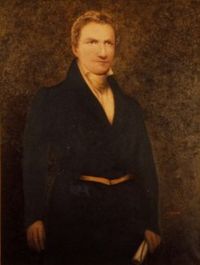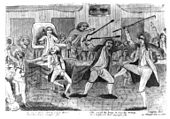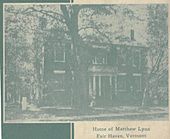- Matthew Lyon
-
Matthew Lyon 
Painting of Lyon in the Vermont Capitol building.
This file is a candidate for speedy deletion. It may be deleted after Friday, 21 October 2011.Member of the U.S. House of Representatives
from Vermont's 1st districtIn office
March 4, 1797 – March 3, 1801Preceded by Israel Smith Succeeded by Israel Smith Member of the U.S. House of Representatives
from Kentucky's 1st districtIn office
March 4, 1803 – March 3, 1811Preceded by Thomas T. Davis Succeeded by Anthony New Personal details Born July 14, 1749
Dublin, County Wicklow, IrelandDied August 1, 1822 (aged 73)
Spadra Bluff, ArkansasPolitical party Democratic-Republican Spouse(s) Mary Horsford and Beulah M. Chittenden Children Ann Lyon
James Lyon
Pamela Lyon
Lorraine Lyon
Minerva Lyon
Chittenden Lyon
Aurelia Lyon
Matthew Lyon Jr.
Noah Lyon (died in infancy)
Beulah Lyon
Giles Lyon
Elizabeth LyonProfession farmer, printer, congressman Matthew Lyon (July 14, 1749 – August 1, 1822), father of Chittenden Lyon and great-grandfather of William Peters Hepburn, was a printer, farmer, soldier and politician, serving as a United States Representative from both Vermont and Kentucky.
Lyon was born near Dublin, in nearby County Wicklow, Ireland, and attended school in Dublin. He began to learn the printer's trade in 1763, but emigrated to Connecticut in 1765. Lyon landed as a redemptioner and worked on a farm in Woodbury, where he continued his education.
In 1774, Lyon moved to Wallingford, Vermont (then known as the New Hampshire Grants), and organized a company of militia. He served as adjutant in Colonel Seth Warner's regiment in Canada in 1775, and was then commissioned a Second Lieutenant in the regiment known as the Green Mountain Boys in July 1776. He moved to Arlington, Vermont, in 1777.
Contents
Political Life
Lyon served briefly during the Revolutionary War, ending his service on a low note when General Horatio Gates court martialed him for cowardice. Reportedly, Lyon was ordered to carry a wooden sword to represent his shame.[1] Lyon became a member of the Vermont House of Representatives, serving from 1779 to 1783. He founded Fair Haven, Vermont in 1779 and returned to the state House of Representatives for ten years from 1783 to 1796.
Lyon built and operated various kinds of mills, including one for the manufacture of paper. He established a printing office in 1793 and published the Farmers' Library, afterward the Fair Haven Gazette. Lyon was an unsuccessful candidate for election to the Second and Third Congresses, and unsuccessfully contested the election of Israel Smith to the Fourth Congress. He was elected as a Democratic-Republican to the Fifth and Sixth Congresses (March 4, 1797 - March 3, 1801); he was not a candidate for renomination in 1800.
Lyon had the distinction of being the first member to have an ethics violation charge filed against him when he was accused of "gross indecency" for spitting in Roger Griswold's face. Griswold, a Congressman from Connecticut had insulted Lyon, calling him a scoundrel, which at the time was considered profanity. On January 30, 1798. Congress planned to have a meeting to remove William Blount, of Tennessee, from office. Griswold was trying to attract Lyon's attention, but Lyon was ignoring him on purpose, since they belonged to opposing political parties (Lyon was a Democratic-Republican and Griswold a Federalist). Griswold finally lost his temper and insulted Lyon. Their clash began when Lyon began a Congressional discussion by declaring himself a champion for the interest of the common man. Mockingly, Federalist Congressman Roger Griswold asked if Lyon would be fighting with his wooden sword, a reference to Lyon's dismissal for cowardice during the Revolutionary War. Furious, Lyon spat on the Congressman, earning himself the nickname "The Spitting Lyon". On February 15, 1798, Griswold retaliated by beating Lyon around the head with a wooden cane in view of other representatives on the Senate floor. Lyon retreated to a fire pit and defended himself with the tongs until other Congressmen broke up the fight.[2] Griswold had to be pulled by his legs to urge him to let go of Lyon.[3]. Although the Ethics Committee recommended censure, the House as a whole rejected the motion to censure him.[4] Having married the daughter of Governor Chittenden, it is possible Lyon had too much pull to have been removed;[5] though other argue it was because any actions taken against Lyon would have to be equaled against Griswold.[6]
Lyon also has the distinction of being the only person to be elected to Congress while in jail. On October 10, 1798, Lyon was found guilty of sedition, in violation of the Alien and Sedition Acts; which prohibited malicious writing of the American government as a whole, or of the houses of Congress, or of the President of the United States. Lyon was the first person to be put to trial for violating the acts on charges of criticizing Federalist president John Adams for his pretense of going to war against France.
Sedition
Lyon had launched his own newspaper, The Scourge Of Aristocracy and Repository of Important Political Truth,[7] when the Rutland Herald refused to published his perceived radical work. On October 1st, Lyon printed this paper speaking of the "unbounded thirst for ridiculous pomp, foolish adulation, and selfish avarice," as well as Adams' corruption of religion to further his war aims.[8] At the time it was quite common for Federalists to cite religious reasons for going to war against France; as well as for silencing the opposition.[9] Lyon had also, before the Alien and Sedition Acts had been passed, written a letter to one Alden Spooner, the publisher of the Vermont Journal. In this letter, which was written in response to perceived personal attacks from the Journal, Lyon called the president "bullying," and the Senate's responses "stupid."[10] Once the Alien and Sedition Acts were passed, the Federalists pushed for this letter to be printed in the Vermont Journal, adding charges to Lyon by subterfuge.[11] One other charge included publishing letters written by the poet Joel Barlow, which Lyon had read at political rallies.[12] These also were published prior to the Acts.[13][14] Lyon's defense was to be the unconstitutionality of the Acts, as Jeffersonians saw these Acts as violating the First Amendment to the Constitution. In Lyon's particular case, there was the aforementioned letter to Alden Spooner as well as that of Barlow, which meant Lyon felt entitled to bring up the Constitution's safeguards against ex post facto laws.[15][16] This defense was not allowed.[17][18]
Lyon was sentenced to four months in a Vergennes jail cell of dimensions 16' x 12' used for felons, counterfeiters, thieves, and runaway slaves; and ordered to pay a $1,000 fine and court costs, while Judge Paterson lamented being unable to give a harsher punishment.[19] A bit of a resistance movement was created; the Green Mountain Boys even threatened to destroy the jail and might have done so if not for Lyon urging peaceful resistance.[20] While in jail, Lyon won election to the Sixth Congress; nearly doubling the votes of his best adversary, 4,576 to 2,444.[21] Upon his release Lyon exclaimed "I am on my way to Philadelphia!"[22] In the election of 1800 Matthew Lyon cast the deciding vote for Jefferson after the election went to the House of Representatives because of an electoral tie. Lyon's trial, conviction, and incarceration boosted his status among the fledgling American Republican political elite as something of a free-speech martyr.[23]
Life away from Vermont
Lyon moved to Kentucky in 1801 and settled in Caldwell County (now Lyon County). He became a member of the Kentucky House of Representatives in 1802 and was elected to the Eighth and to the three succeeding Congresses (March 4, 1803 - March 3, 1811). He was an unsuccessful candidate for reelection in 1810 to the Twelfth Congress.
Lyon was appointed United States factor to the Cherokee Nation in Arkansas Territory in 1820; and again attempted to serve in Washington, DC when he unsuccessfully contested the election of James W. Bates as a Delegate from the Arkansas Territory to the Seventeenth Congress. Lyon died in Spadra Bluff, Arkansas, August 1, 1822; interment in Spadra Bluff Cemetery; reinterment in Eddyville Cemetery, Eddyville, Caldwell (now Lyon) County, Ky., in 1833.
Personal life
- Lyon was married twice. Once to one Mary Horsford in 1772, until she died in 1782. Mary was the daughter of Samuel Horsford and Mary Grant. Mary Grant had been previously married to Daniel Allen, the uncle of Ethan Allen, until his death.[24] Lyon's second marriage was to one Beulah M. Chittenden, the daughter of Thomas Chittenden, in 1784.[25]
- Matthew Lyon's son James (1776-1824) may have also been indicted by the federal government for violating the Sedition Act, since he was connected with his father and with James Thomson Callender.[26] It is believed he might have fled to evade capture.[27]
- Matthew Lyon's son Chittenden Lyon (1787–1842) was also a member of the U.S. House of Representatives (1827–1835) from Kentucky.
- Matthew Lyon's son Matthew (1792–1839) was the father of Confederate General Hylan B. Lyon (Feb 22, 1836-April 25, 1907) of Lyon County, Kentucky. Hylan Lyon was the father of Frank Lyon of the USS Oregon.
References
- ^ McLaughlin, pg. 225
- ^ http://artandhistory.house.gov/highlights.aspx?action=view&intID=233
- ^ Miller, The Federalist Era, pg. 208
- ^ McLaughlin, pg 276-300
- ^ Miller, The Federalist Era, pg. 209
- ^ Bowers, pg 361
- ^ McLaughlin, pg 199
- ^ Bowers, pg. 386
- ^ cf. "Thou Shalt Not Bear False Witness Against Thy Neighbor" Vergennes Gazette 14 Mar. 1799
- ^ Bowers, pg. 386
- ^ Ibid
- ^ http://www.fjc.gov/history/home.nsf/page/tu_sedition_hd_statements.html
- ^ Bowers, pg. 386
- ^ Miller, Crisis, pg. 107
- ^ McLaughlin, pg. 207
- ^ "Trial of Matthew Lyon for Sedition" Vergennes Gazette 11 Oct. 1798
- ^ Ibid.
- ^ Miller, Crisis, pg. 108
- ^ Ibid.
- ^ Bowers, pg. 387
- ^ Ibid
- ^ Ibid, pg. 388
- ^ Miller, Crisis pg. 109
- ^ http://familytreemaker.genealogy.com/users/p/o/p/Sandra-Popiel/BOOK-0001/0131-0006.html
- ^ http://familytreemaker.genealogy.com/users/n/e/l/Mary-Rita-Nelson/GENE9-0001.html
- ^ Blumberg, pg. 141
- ^ Windham Herald 26 Oct 1799
Sources
- Austin, Aleine. Matthew Lyon: "New Man" of the Democratic Revolution, 1749-1822. University Park: Pennsylvania State University Press, 1981;
- Blumberg, Phillip I. Repressive Jurisprudence in the Early American Republic: the First Amendment and the Legacy of English Law. Cambridge: Cambridge UP, 2010.
- Bowers, Claude Gernade. Jefferson and Hamilton: the Struggle for Democracy in America,. Boston and New York: Houghton Mifflin, 1925.
- McLaughlin, J. Fairfax. Matthew Lyon, the Hampden of Congress a Biography. New York: Wynkoop Hallenbeck Crawford, 1900.
- Miller, John C. The Federalist Era: 1789-1801. New York: Harper & Row, 1963.
- Miller, John C. Crisis in Freedom: the Alien and Sedition Acts. Boston: Little, Brown, 1951.
- Montagno, George L. "Matthew Lyon, Radical Jeffersonian, 1796-1801: A Case Study in Partisan Politics." Ph.D. dissertation, University of California at Berkeley, 1954.
External links
Categories:- 1749 births
- 1822 deaths
- Members of the United States House of Representatives from Vermont
- Members of the United States House of Representatives from Kentucky
- Members of the Vermont House of Representatives
- Members of the Kentucky House of Representatives
- American people of Irish descent
- People from County Wicklow
- Continental Army officers
- Political violence in the United States
- Vermont Democratic-Republicans
- Kentucky Democratic-Republicans
- Vermont colonial people
- Sedition
- Vermont militiamen in the American Revolution
- People of Vermont in the American Revolution
Wikimedia Foundation. 2010.


